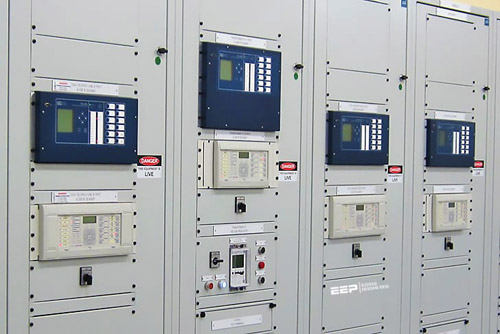
Protective Relay Training—This 12-hour live online instructor-led training course provides a comprehensive understanding of industrial, commercial, and institutional power system protection. Relay technicians, system protection engineers, consultants, and engineers and technicians working in system protection should take this course.
Our Protective Relay Training course will benefit personnel of all levels of experience because it covers a range of relay schemes' complexity and methods of testing and analyzing relay operations. We discuss system protection principles, measurement devices used for relaying, basic relay schemes, and the most common schemes used in the field. This course provides professionals with real examples from actual system protection situations.
This Protective Relay Training course will cover relay theory and operation of modern digital types from two major North American relay manufacturers (GE Multilin and SEL), covering many types of functions such as phase, ground, negative sequence overcurrent, over and under voltage, over and under frequency, reverse power, distance and bus/transformer/line differential. Topics such as complete motor protection, fault current basics and the application of fuses and circuit breakers/contactors in industrial and distribution substations will also be covered.
Engineers who need a comprehensive understanding of the challenges and solutions for protecting electrical power systems should attend this course.
The Protective Relay Training course provides basic relay application and settings calculation guidelines. It also reviews basic power system concepts and describes instrument transformers. This training course is designed for technicians, operators, maintenance personnel and engineers who need a comprehensive understanding of the challenges and solutions for protecting industrial power systems. This training course provides guidelines on downloading and installing North American relay manufacturers software packages, establishing communication between laptop and relay, and basic relay logic programming examples. The course provides guidelines for the relay protection application, principles and setting calculation and an overview of the principles of the relaying protection for motors, transformers, medium voltage cables, feeders, buses, generators, transmission and distribution lines, breaker failure and capacitor banks. This training course reviews basic power system concepts and current and voltage instrument transformers. Protection requirements for industrial plants, cogeneration, and interconnection with the utility power system are explained in detail. This course covers the subject of power system protection from a practical perspective and includes important functional aspects such as testing and coordination of protection systems. This course is designed for individuals involved with industries and utilities that depend on proper system protection for operational efficiency and minimizing damage to equipment.
A properly designed protection system with downstream devices (breakers/fuses/relays) should be activated before upstream devices. This minimizes the system portion affected by a fault or other disturbance. At the substation level, feeder breakers should trip before the main. Likewise, downstream panel breakers should trip before the substation feeder supplying the panel.
Power System Protection And Coordination of various electrical equipment and apparatus requires a good understanding of phase and ground short circuit currents, detection, and safe clearing of the faulted equipment.
Large or small, every industrial, commercial and institutional organization needs to understand how to protect their investment in electric power systems. To do this properly, companies need to know how to perform an electrical protection analysis of all the parts of their power system, such as analyzing fault data, coming up with protection settings, and then getting all of the components of their plant to be controlled by the operators who are responsible for integrating their power system into communication and data acquisition modes.
Students will learn the essentials of electrical protection design, relay coordination, fusing fundamentals, and breaker fundamentals. They will also be provided with an understanding of digital protective relaying as we go through practical examples of electrical protection for generators, feeders, motors, and transformers.
COURSE OBJECTIVES
COURSE BENEFITS
The Electrical Protection Coordination Training Course:
Basic Protective Relay Training Course Outline
DAY ONE
SESSION 1: Power System Faults and Components of Power System Protection Schemes
SESSION 2: Microprocessor-based relays
SESSION 3: Feeder Overcurrent Protection
SESSION 4: Coordination of Electrical Protection Systems
DAY TWO
SESSION 5: Bus Protection
SESSION 6: Transformer Protection
SESSION 7: Generator Protection
SESSION 8: Motor Protection and Starting
COURSE SCHEDULE:
Both days:
Start: 10 a.m. Eastern Time
Finish: 4:30 p.m. Eastern Time
The registration fee to attend this live online training course is $599 + GST/HST.
Click Here to download a $100 discount coupon that you can apply toward the regular registration fee and pay only $499 + GST/HST
Register 3 delegates at full price $599, and get a 4th registration FREE!
Successful completion of this course qualifies delegates to receive a certificate of course completion with indicated CEUs.
CEUs are granted by the Engineering Institute of Canada. One CEU is equivalent to 10 professional development hours of instruction.
This course earns 1.2 CEUs.